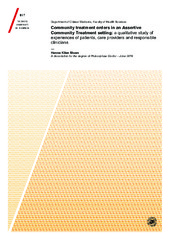| dc.contributor.advisor | Wynn, Rolf | |
| dc.contributor.author | Stuen, Hanne Kilen | |
| dc.date.accessioned | 2019-11-25T07:59:32Z | |
| dc.date.available | 2019-11-25T07:59:32Z | |
| dc.date.issued | 2019-11-01 | |
| dc.description.abstract | This study is part of the national research-based evaluation of the 12 first assertive community treatment (ACT) teams in Norway. ACT is a model for multidisciplinary community-based treatment teams that aim to provide a full range of medical, psychosocial and rehabilitation services to people with severe mental illness. Over 30% of the patients treated in the ACT teams were subject to community treatment orders (CTOs) at intake during the teams’ first year of operation.
CTOs, which is a legal tool to compel patients with severe mental illness to adhere to outpatient treatment, have been widely used since the Norwegian Mental Health Care Act was implemented in 1961. Previous studies have shown that patients consider CTOs as a more restrictive intervention than clinicians do. Many patients experience CTOs as disempowering, and many patients feel that clinicians’ one-sided focus on medication impedes their recovery processes.
In this qualitative study, Stuen and colleagues investigated how patients, ACT providers and responsible clinicians experienced CTOs and CTO decision making within the context of the relatively newly established ACT teams. Stuen and colleagues show that patients have mixed views of CTOs. However, the ACT team’s availability, the flexible combination of interventions, continued care, support and possibility to make choices were described as important improvements compared to traditional office-based mental health services. Several of the participants described a gradual transition toward regarding the CTO as an acceptable solution, provided that they received other services they found beneficial. For clinicians, CTO decisions involve dilemmas and difficult professional judgements, and they highlighted the opportunities the multidisciplinary team provided for discussions and shared responsibility for follow-up care. The ACT model’s structured approach, the daily team meetings and the sharing of ideas about how to handle clinical problems allowed for more flexibility and, they believed, more voluntary options. | en_US |
| dc.description.doctoraltype | ph.d. | en_US |
| dc.description.popularabstract | This study is part of the national research-based evaluation of the 12 first assertive community treatment (ACT) teams in Norway that took place between 2009 and 2014. The purpose of this study was to investigate patients’, care providers’ and responsible clinicians’ experiences with community treatment orders (CTOs) and CTO decision making in relatively newly established ACT teams. ACT is a model of multidisciplinary community-based treatment teams that aims to provide a full range of medical, psychosocial and rehabilitation services to people with severe mental illness. In this study, 15 in-depth interviews with patients subject to CTOs were conducted. We also interviewed 8 responsible clinicians and conducted four focus group interviews with 20 providers. The data were analysed using a modified grounded theory approach.
CTOs, which is a legal tool to compel patients with severe mental illness in the community, have been widely used since the implementation of the Mental Health Care Act in 1961. The results show that patients have mixed views of CTOs. However, the ACT team’s availability and the flexible combination of interventions, continued care and possibility to make choices were considered as important improvements to traditional office-based mental health services. Several of the patients described a gradual transition of regarding the CTO as an acceptable solution, provided that they received other services they found beneficial. CTO decisions involve dilemmas and difficult professional judgments, and the clinicians highlighted the importance of frequent patient contact, multidisciplinary team discussions and sharing ideas about clinical problems allowed for more flexibility and more voluntary treatment. | en_US |
| dc.description.sponsorship | Sykehuset Innlandet | en_US |
| dc.identifier.isbn | 978-82-7589-649-8 | |
| dc.identifier.uri | https://hdl.handle.net/10037/16695 | |
| dc.language.iso | eng | en_US |
| dc.publisher | UiT The Arctic University of Norway | en_US |
| dc.publisher | UiT Norges arktiske universitet | en_US |
| dc.relation.haspart | <p>Paper 1: Stuen, H.K., Rugkåsa, J., Landheim, A. & Wynn, R. (2015). Increased influence and collaboration: a qualitative study of patients’ experiences of community treatment orders within an ACT community treatment setting. <i>BMC Health Services Research, 15</i>, 409. Also available at <a href=https://hdl.handle.net/10037/8175>https://hdl.handle.net/10037/8175</a>.
<p>Paper 2: Stuen, H.K., Landheim, A., Rugkåsa, J. & Wynn, R. (2018). Responsibilities with conflicting priorities: a qualitative study of ACT providers’ experiences of community treatment orders. <i>BMC Health Services Research, 18</i>(1), 290. Also available at <a href=https://hdl.handle.net/10037/12634>https://hdl.handle.net/10037/12634</a>.
<p>Paper 3: Stuen, H.K., Rugkåsa, J., Landheim, A. & Wynn, R. (2018). How do clinicians make decisions about CTOs in ACT: a qualitative study. <i>International Journal of Mental Health Systems, 12</i>, 51. Also available at <a href=https://hdl.handle.net/10037/13854>https://hdl.handle.net/10037/13854</a>. | en_US |
| dc.rights.accessRights | openAccess | en_US |
| dc.rights.holder | Copyright 2019 The Author(s) | |
| dc.subject.courseID | DOKTOR-003 | |
| dc.subject | VDP::Medisinske Fag: 700::Helsefag: 800::Helsetjeneste- og helseadministrasjonsforskning: 806 | en_US |
| dc.subject | VDP::Medical disciplines: 700::Health sciences: 800::Health service and health administration research: 806 | en_US |
| dc.title | Community Treatment Orders in an Assertive Community Treatment setting: a qualitative study of patients, care providers and responsible clinicians | en_US |
| dc.type | Doctoral thesis | en_US |
| dc.type | Doktorgradsavhandling | en_US |


 English
English norsk
norsk